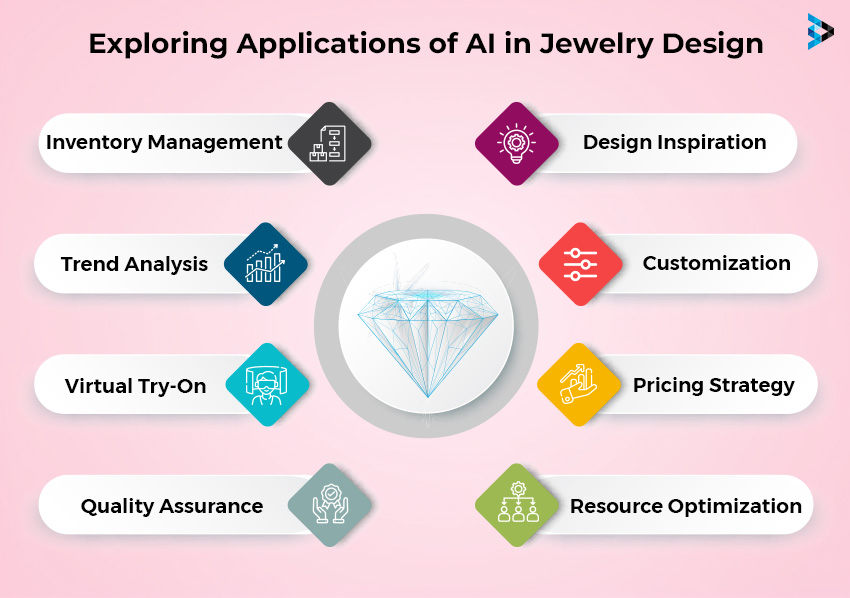The jewelry industry has long been revered for its artistry and attention to detail in the world of luxury and craftsmanship. However, as technology continues to advance, artificial intelligence (AI) is emerging as a game-changer, revolutionizing every aspect of jewelry design, manufacturing, and customer experience.
In fact, a recent report estimated the global smart jewelry market size to expand at a compound annual growth rate of 16.9% until 2030. This staggering growth is a testament to AI’s impact on the jewelry industry.
The integration of AI is not only enhancing efficiency and productivity but also opening up new realms of personalization and innovation. Let’s take a deeper look at how AI is transforming the jewelry industry.
AI-Powered Design and Manufacturing
AI is revolutionizing the jewelry design and manufacturing process, enabling increased efficiency, creativity, and customization. From computer-aided design to additive manufacturing, AI has recently been playing a pivotal role in streamlining operations and optimizing production.
- Computer-Aided Design (CAD) and 3D Modeling
AI-powered CAD and 3D modeling software allow jewelers to create intricate and precise designs with ease. These tools can generate realistic 3D renderings, enabling designers to experiment with different materials, gemstones, and design elements.
- Generative Design and Optimization
Generative design algorithms leverage AI to explore countless design variations, identifying the most structurally sound and aesthetically pleasing options. This technology can push the boundaries of creativity and innovation, leading to truly unique and avant-garde pieces.
- Additive Manufacturing (3D Printing)
Additive manufacturing, or 3D printing, is an area where AI is making significant strides. AI-powered software enables jewelers to produce complex and customized pieces with minimal waste and faster turnaround times, optimizing the manufacturing process.
- Supply Chain Optimization
AI is streamlining supply chain operations in the jewelry industry, enabling better inventory management, optimized logistics, and reduced waste. Predictive analytics and intelligent forecasting help ensure the right materials and products are available when and where they are needed.
- Quality Control and Gemstone Grading
AI algorithms can analyze images and data from advanced imaging techniques to accurately grade gemstones based on their cut, color, clarity, and carat weight. This technology ensures consistent quality and authenticity across production runs.
Challenges in Adopting AI in the Jewelry Industry
While the potential benefits of AI in the jewelry industry are significant, there are several challenges that must be addressed to ensure successful adoption and implementation.
| Challenge | Description |
| Data availability and quality | The lack of comprehensive and high-quality datasets poses a challenge in developing accurate AI models. |
| Integration with traditional processes | Bridging the gap between AI technologies and traditional jewelry-making techniques requires careful planning and training. |
| Skill gaps and training requirements | Acquiring new skills and expertise to work with AI technologies is essential for a smooth transition. |
| Cost and investment considerations | Implementing AI solutions can be capital-intensive, especially for smaller businesses. |
| Ethical and sustainability concerns | Ensuring responsible and transparent practices, protecting human rights, and minimizing environmental impact is critical. |
The Solution
AI-Driven Innovation in the Jewelry Industry AI is enabling jewelers to overcome challenges and unlock new opportunities.
| Solution | Description |
| Personalized and Customized Designs | AI enables jewelers to offer unique and personalized pieces tailored to individual preferences. |
| Virtual Try-On and Augmented Reality Experiences | AI-powered apps allow customers to virtually try on jewelry and experiment with styles. |
| Predictive Maintenance and Quality Assurance | AI algorithms can predict maintenance needs and enhance quality control processes. |
| Intelligent Inventory Management | AI-powered systems optimize stock levels, reduce waste, and ensure product availability. |
| Sustainable and Ethical Sourcing | AI supports responsible and conflict-free sourcing through traceability and transparency initiatives. |
Use Cases of AI-Powered Jewelry Design
Custom Jewelry Design and Manufacturing
Beyond just allowing customers to customize designs based on their preferences, AI is enabling jewelers to push the boundaries of creativity and innovation. Generative design algorithms can explore design possibilities that human designers may not have considered, leading to truly unique and avant-garde pieces.

AI can also optimize designs for various factors beyond aesthetics, such as structural integrity, material usage, and manufacturing efficiency. This not only ensures that the final product is both beautiful and functional but also helps minimize waste and reduce production costs.
Virtual Jewelry Try-On and Consultations
While virtual try-on experiences enhance the customer’s ability to visualize jewelry pieces, AI can take it a step further by providing personalized recommendations and styling suggestions. AI can suggest complementary pieces or recommend jewelry styles that best suit their look by analyzing a customer’s preferences, purchase history, and even physical features (through computer vision).
Furthermore, AI-powered virtual consultants can guide customers through the entire jewelry selection process, answering questions, providing expert advice, and offering personalized recommendations based on the customer’s needs and budget.
Predictive Demand Forecasting and Inventory Management
In addition to predicting demand for specific jewelry pieces, AI can also help optimize inventory levels across different sales channels and geographic locations. By analyzing regional preferences, seasonal trends, and historical sales data, AI can recommend inventory allocation strategies that ensure the right products are available where and when customers want them.
AI can also be used to streamline the procurement and replenishment processes, automatically placing orders with suppliers based on predicted demand and inventory levels, reducing the risk of stockouts or overstocking.
Gemstone Grading and Authentication
Beyond just grading and authenticating individual gemstones, AI can be used to analyze and certify entire jewelry pieces. This includes verifying the authenticity of the metals used, ensuring that the piece meets quality standards, and even detecting any potential defects or flaws.
AI can also be used to track and monitor the condition of gemstones and jewelry over time, alerting owners or insurers to any changes or damage that may occur, and enabling timely maintenance or repairs.
Sustainable and Ethical Sourcing Practices
AI can not only track the origin and journey of gemstones and precious metals but also help identify and mitigate potential risks or ethical concerns along the supply chain. By analyzing data from various sources, AI can detect potential human rights violations, environmental impacts, or other issues that may be associated with specific suppliers or regions.
Furthermore, AI can be used to optimize logistics and transportation processes, reducing the carbon footprint and environmental impact of the jewelry supply chain.
Customer Engagement and Personalized Experiences
AI can be used to analyze customer feedback, social media sentiment, and other data sources to gain insights into customer preferences, pain points, and emerging trends. This information can then be used to refine and improve the customer experience, tailoring marketing campaigns, product offerings, and even in-store experiences to better meet customer needs.
Additionally, AI can be integrated with customer relationship management (CRM) systems to provide a seamless and personalized experience across multiple touchpoints, whether it’s online, in-store, or through customer service channels.

Benefits of AI in the Jewelry Industry
Increased Efficiency and Productivity
By automating repetitive tasks and streamlining processes, AI solutions are enabling jewelers to achieve higher levels of efficiency and productivity. From design to manufacturing and quality control, AI is reducing the time and resources required, allowing jewelers to focus on creativity and customer service.
Cost Savings and Optimization
AI-driven inventory management, supply chain optimization, and predictive maintenance solutions are helping jewelers reduce waste, minimize excess stock, and extend the lifespan of their equipment. These cost savings can be reinvested into product development, marketing, or other areas of business growth.
Personalized and Customized Products
AI empowers jewelers to offer truly unique and customized pieces that cater to individual preferences and styles. From custom designs to personalized recommendations, AI is enhancing the customer experience and driving customer loyalty.
Enhanced Customer Experience
Virtual try-on experiences, personalized recommendations, and AI-powered customer service tools are revolutionizing the way customers interact with jewelers. These AI-driven solutions provide a seamless and engaging experience, building stronger connections with customers and fostering brand loyalty.
Sustainable and Ethical Practices
AI is supporting the jewelry industry’s efforts to adopt sustainable and ethical practices. By enabling traceability and transparency in sourcing, AI is helping jewelers meet consumer demand for responsible and environment-friendly products.
Data-Driven Insights and Decision-Making
AI algorithms can analyze vast amounts of data, giving jewelers valuable insights into customer preferences, market trends, and operational efficiencies. These data-driven insights inform strategic decision-making, driving business growth and innovation.
Final Words
As AI technology continues to evolve, we may also witness the integration of AI with other emerging technologies, such as the Internet of Things (IoT) and blockchain. By harnessing the power of AI, the jewelry industry is poised to reach new heights of creativity, efficiency, and customer satisfaction. As jewelers embrace this transformative technology, they can craft perfection, blending artistry’s timeless beauty with modern innovation’s cutting-edge capabilities.
Read more: How Combination of BigCommerce and AI Helps E-commerce
FAQs
AI plays a crucial role in jewelry design and manufacturing, from computer-aided design and 3D modeling to additive manufacturing and quality control. AI algorithms can generate intricate designs, optimize structural integrity, and streamline production processes.
While AI can generate intricate and optimized designs, human creativity and artistic vision remain essential in the jewelry industry. AI is a powerful tool that enhances and complements human designers but does not replace them entirely.
AI algorithms can analyze images and data from advanced imaging techniques to accurately grade gemstones based on their cut, color, clarity, and carat weight. AI can also detect and prevent fraud by authenticating the origin and provenance of gemstones.
AI-powered virtual try-on and augmented reality experiences enhance the customer experience by allowing them to visualize and experiment with different jewelry pieces without physically trying them on. This not only improves the shopping experience but also reduces the need for physical inventory, lowering costs for jewelers.
AI can enable traceability and transparency in the sourcing of gemstones and precious metals. By leveraging blockchain technology and AI-driven tracking systems, jewelers can ensure their materials are sourced from responsible and conflict-free sources, supporting ethical practices and environmental sustainability.
AI algorithms can analyze historical sales data, customer preferences, and market trends to accurately predict demand for specific jewelry pieces. This allows jewelers to optimize their inventory levels, reducing excess stock and minimizing waste.
Data privacy and security are legitimate concerns when implementing AI solutions. Jewelers must ensure that they comply with relevant data protection regulations and implement robust cybersecurity measures to safeguard sensitive customer and business data.
One of the main challenges in integrating AI with traditional jewelry-making techniques is bridging the gap between technology and the skilled craftmanship that has been passed down for generations. Jewelers may need to undergo training to learn how to effectively utilize AI tools and software, while also preserving the artistic and cultural aspects of their craft.
Jewelers can partner with educational institutions or technology companies to provide training programs and workshops that equip their workforce with the necessary skills to work with AI technologies. This may include courses on computer-aided design, 3D modeling, data analysis, and programming.
The future of AI in the jewelry industry is exciting, with several potential advancements on the horizon. We may see the development of more advanced generative design algorithms that can create truly unique and one-of-a-kind pieces, pushing the boundaries of creativity and artistry.
Related Articles
-
Digital Product Engineering: Transforming Ideas into Market-Ready Solutions
As an entrepreneur, you will always seek strategies and solutions to take your business to the next paradigm. Doing that is not easy, as identifying tools and methods to multiply
-
Difference Between Artificial Intelligence and Machine Learning
The world of technology is evolving, but our approach to communicating these advancements are dated. As a result, we see a lot of people confused about key technological concepts. Generally,
-
Top AI-based Logistics Softwares
In 2025, supply chain and logistics industries increasingly adopt AI-driven platforms to enhance efficiency, improve decision-making, and tackle complex challenges. These platforms utilize advanced technologies such as machine learning, predictive




